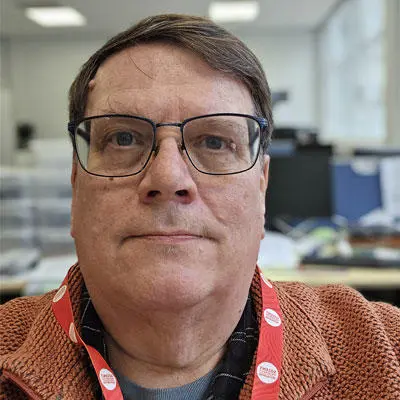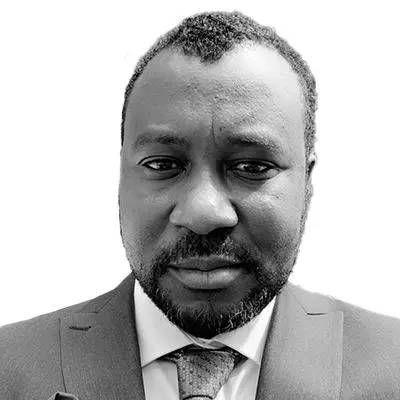
“Solent has it right, however, with industry-focused courses and lecturers.”


Get ahead in an electronics career with this professionally accredited programme, combining practical challenges, excellent facilities and teaching from industry specialists and academic researchers.
This foundation year is the ideal way to prepare for degree study. Upon successful completion, you can progress to the three-year degree in BEng (Hons) Electronic Engineering.
The degree offers a broad curriculum covering everything from analogue and digital electronics to contemporary embedded systems, signal processing technologies and modern communications, graduates can expect to seek employment in research and development, maintenance engineering, electronic design, telecommunications and much more.
In the first year of the degree, students develop a solid foundation in maths and circuitry before getting to grips with analogue, digital and microcomputer systems. The latter half of the year is focused on developing an understanding of industry software, key professional skills and manufacturing techniques.
These proficiencies will form a solid foundation for the second and third year, where students will study embedded systems and advanced data communications, carry out their own research and undertake a major practical project.
This course is also offered as standard full-time study to students or on a one-day-per-week part-time study basis for professional CPD for staff already in employment.
This course is part of the South Coast Institute of Technology (IoT), a partnership of colleges, universities and industry-leading employers to create new career opportunities in the technology sector. IoT courses like this one are precisely tailored to the needs of employers in the maritime, engineering and digital industries – industries which are hungry for talented new engineers, technologists, technicians and creatives like you.
Contact international admissions
Email: Call:Accredited by:

Part of:

Our creative degrees allow our students to develop a critical eye for design with a knowledge of different design approaches and problem solving techniques. Take a look at some of the great work they produce.

If you're not quite ready for a full undergraduate degree, there's alternative entry through one of our foundation years
After successfully completing your studies, there's an opportunity to continue your studies at Solent
You can study this course part-time
If you have an appropriate Level 5 qualification, you can top it up to a degree in just a year
This course has access to specialist facilities
You have the opportunity to study abroad in one of our partner universities for a semester on this course
This course is intended for students without the UCAS points for direct entry. This could be mature students returning to education, younger students without the required qualifications, or students looking to change career path after completing further education qualifications.
This course can lead to a career in a range of electronic industries or further study. Graduate opportunities include a range of career paths in electronic design, microcomputer or embedded systems, possibly automation or circuit development.


Hear from Solent alumni about where their careers have taken them and how studying at Solent prepared them for their future.
Read more stories
“Solent has it right, however, with industry-focused courses and lecturers.”

The engineering team has a diverse range of academic and industrial experience and research interests in the fields of digital signal processing, micro-controller and embedded programming, the automation of sensing, capturing and processing data, and a range of electronic communication and simulation methods.

Associate Professor

Technician Instructor

Lecturer

Course Leader

Associate Lecturer

Lecturer

Senior Lecturer

Associate Professor

Associate Lecturer

Lecturer
The University cannot guarantee any particular members of staff will teach specific aspects of the course in the future, but will endeavour to ensure the teaching team maintains their balance of experience and qualifications.
Electronic engineering students benefit from access to a range of high-end facilities including rapid prototyping equipment, PSpice/NI MultiSim software and microcomputer development systems. Solent University also offers students access to digital multi-meter signal generators, FLIR cameras and digital signal processing (DSP) boards – all of which allow students to better understand how the theory they have learnt links to real workplace scenarios.
Laboratories also include NI MultiSim eCAD software, rapid prototyping equipment with 3D printers and laser cutters, and a wide range of development systems for microcomputer and microcontroller systems.
Broaden your horizons by adding an international dimension to your CV – essential to achieving success in today’s fast-changing, global environment.
Studying, working or volunteering in another country could be the experience of a lifetime. Enhance your degree by developing important global skills such as knowledge of other countries, language skills, intercultural awareness, adaptability and confidence.
For more information, please email international.mobility@solent.ac.uk.

In this module you will develop a range of key skills and knowledge designed to help you develop the underpinning knowledge and skills for the remaining modules of the course. This can be broadly categorised into: communication skills; collaborative skills; numeracy skills; information and communication technology skills and problem solving skills.
You will build on the Science and Engineering Foundation Skills module, exploring fundamental approaches to mathematics, such as numbering systems and Boolean logic.
You will study theoretical science and engineering related topics from a range of general areas related to the parent degrees supported by the course.
You will plan and undertake experiments, or validate numerical models, related to science and engineering related topics from a range of general areas related to the parent degrees supported by the course (these are outlined in more detail in the STEM Concepts and Processes (Theory) module).
This module is designed to help you to develop a range of transferable academic and career planning skills.
The learning on this module is primarily derived from an experiential approach, enabling you to apply the skills and knowledge from the other modules to the analysis of a real problem related to your interests.
Solent’s curriculum framework builds on our unique, creative and applied approach to teaching. The transformation of students’ lives is at the heart of our mission as a university, and our curriculum – informed by the latest theory – reflects this shared educational vision.
Find out more
The student achievement team are on hand to help you succeed during your studies at Solent. They aim to contact you at key times during your time here with personalised information, advice and guidance, by email or phone.
The disability advice team provides information, advice and guidance for disabled students.
All students can access Succeed@Solent, Solent's online guide to getting better grades. It offers extensive, practical information and advice on topics such as academic writing, research and presentations.
According to the Engineering Council, 18 per cent of the UK's workforce works in engineering. However, the sector is experiencing a skills shortage with a number of engineering occupations featuring in the Government's shortage occupations list. Electronic engineering is one of these occupations, meaning there should be many opportunities for industry-ready graduates to make their mark.
This course aims to provide students with the knowledge that electronic engineering employers will require. These range from essential mathematical concepts to circuitry, automation, data communications and signal processing skills. Critically, past students have been able to gain an insight into real-life engineering problems, tackling projects defined for them by our network of industry contacts.
Students are encouraged to interact with the industry throughout the curriculum. In previous years, Solent’s engineering students have had the opportunity to work closely with employers such as Rolls-Royce, SAAB, Sea Eye, TUV and Coopervision. The Institution of Engineering and Technology and the Wessex Round Table of Inventors (WRTI) have also held regular local professional development events on campus.

Starting salary: £25,000 to £33,000
Graduate training schemes may pay towards the top end of the starting scale. With experience, possibly working at an incorporated engineer level, you could earn around £30,000 to £45,000. As a senior engineer you can expect a salary in the range of £45,000 to over £65,000, with chartered engineers earning a salary at the top end of this scale.
Starting salary: £20,000 to £25,000
Mid-range salaries usually fall between £30,000 and £38,000. With experience, your salary could rise to £45,000.
The stated salaries are published on prospects.ac.uk. Income figures are intended as a guide only.


Hear from Solent alumni about where their careers have taken them and how studying at Solent prepared them for their future.
Read more stories
“Solent has it right, however, with industry-focused courses and lecturers.”

The Solent Careers team is committed to getting students into great careers.
While you are studying, the team can help you with finding work experience or placements, link you with a mentor, check your CV, or offer one-to-one guidance.
If you're in your final year, we also have graduate job opportunities just for Solent graduates.

6th
UK uni for sustained employment
Longitudinal Educational Outcomes, 2022
Accredited by:

Part of:

Our engineering degrees form part of the South Coast Institute of Technology (IoT), a partnership of colleges, universities and industry-leading employers to create new career opportunities in the technology sector. IoT courses like this one are precisely tailored to the needs of employers in the maritime, engineering and digital industries - industries which are hungry for talented new engineers, technologists, technicians and creatives like you.
Our engineering facilities are benefitting from a £8m investment to build a 2,000m2 state-of-the-art engineering centre - meaning students continue to have access to some of the most cutting-edge technologies to help support their studies while at Solent.

The tuition fees for the 2025/26 academic year are:
For further information, please visit our tuition fees page.
While most course costs are covered by your tuition fees, some essential resources and optional extras may need to be paid for separately. These additional costs are listed below. For advice on budgeting and managing your money, please contact student.funding@solent.ac.uk.
The 2025/26 other costs are not yet available. For guidance, the 2024/25 other costs were:
Optional costs
Solent University offers a range of bursaries and scholarships that provide financial assistance or waive fees for tuition or accommodation. Each bursary or scholarship has specific eligibility criteria. Check out our bursaries and scholarships pages to find out more.
Solent EU Welcome Scholarship (Fee Discount)
This scholarship is available to students from an EU country, with EU nationality, who are applying for an undergraduate course starting in September 2025. The scholarship will reduce your tuition fees to £10,500 per year - this includes foundation years.
Find out more about the scholarship
Cost of living support
At Solent, we understand that the cost of living crisis may be of some concern. To help, we've put together some detailed information to show what support is available and how to make your money go further.
There is no charge to attend graduation, but you will be required to pay for the rental of your academic gown (approximately £45 per graduate, depending on your award). You may also wish to purchase official photography packages, which range in price from £15 to £200+. Graduation is not compulsory, so if you prefer to have your award sent to you, there is no cost. Extra guest tickets will go on sale after results publication and will be sold on a first-come-first-served basis. The cost per ticket is currently £15. Please note, we do not guarantee there will be any extra tickets available to purchase.
Please select an option below:
As a general guide, we look for qualifications that are equivalent to the British high school A-levels.
If you are applying from outside the UK, find information about entry requirements, visas and agents for your country here.
For further information about EU qualifications, please see our course entry requirements document.
As a general guide, we look for qualifications that are equivalent to the British high school A-levels.
If you are applying from outside the UK, find information about entry requirements, visas and agents for your country here.
For further information about international qualifications, please see our course entry requirements document.
All international applicants need to be aware that the English language requirements to attend Solent University, and the English language requirements to obtain a visa from the Home Office, may be different. This means that if you meet the Solent University language requirement to gain a place on the course, you may still have to meet additional requirements to be granted with a visa by the Home Office.
We strongly advise all applicants to visit the Home Office website which outlines all the requirements for a successful visa application.
Contact international admissions
Email: Call:Full-time
Any student applying for the first year of a full-time/sandwich undergraduate course must apply through UCAS (University and Colleges Admissions Service). This includes mature, overseas and EU students.
Nearly all schools and colleges offer their students the facility of applying electronically through the UCAS website using 'Apply'; it may also be used by those applying independently in the UK and overseas. This facility and all course information can be found on the UCAS website: www.ucas.com.
Your application should reach UCAS by 31 January if you hope to enter a course the following autumn. Early application is advised for the most popular subject areas. Late applications may be made until the end of June. The UCAS Code for the University is S30, code name SOLNT.
Find out what happens after you apply
Contextual offers
Solent endeavours to offer learning opportunities to students from all backgrounds. When we receive and review an application, we take into consideration the context and personal circumstances of applicants when making a decision, which means our advertised entry tariff could be reduced.
Top-up route
We welcome applications from students currently studying a Foundation Degree, DipHE, HNC, HND or modules of an undergraduate degree course at another university, who wish to enter directly into Years 2 or 3 of one of our undergraduate degree courses. Please contact our admissions team for more information: contact us
Part-time route
Applications for part-time and distance learning courses are made directly to the University and can be made at any time prior to the start of the course. If you have any questions about applying for this course, please contact the admissions office by emailing admissions@solent.ac.uk.
Applicants who do not have English as their first language will be required to demonstrate an approved level of proficiency in the use of the English language. The agreed minimum requirements for this course are:
IELTS 6.0 overall with a minimum of 5.5 in each individual component
or equivalent.
Qualifications are checked before enrolment, and international students must bring their original certificates or certified copies when coming to study at the University.
The University also offers a pre-sessional English programme for international students who wish to improve their level of English before starting a degree course.


